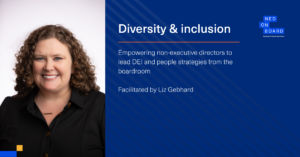Written by Elise Perraud
The average age of non-executive directors serving the top 150 FTSE boards was 60.6 in 2018, up from 59 in 2013 and 58.5 in 2008, representing a 3.6% increase over the 10-year period (source: 2018 UK Spencer Stuart Board Index). Is there a risk that having an older NED pool might put businesses out of touch with modern and contemporary practices and make boards unprepared to address emerging risks and issues as such cybersecurity, climate change, digital transformation and other technology-related disruption? What is the case for younger non-executive directors? What barriers do younger non-executive directors face?
In this blog, NEDonBoard continues its advocacy to increase the representation of younger non-executive directors on boards. While some sectors are at the forefront of cross-generational representation on boards, notably technology, most boards continue to value broad business experience above all.
What barriers do younger non-executive directors face?
“Young” business leaders face barriers in being appointed as NEDs:
- Experience. Boards value broad business experience when they recruit new NEDs. This inevitably results in appointing NEDs that have been through multiple economic cycles and have had extensive executive experience i.e. individuals in their sixties – who tend to be men (and white), negatively impacting gender and ethnic diversity on boards.
- Time commitment. Being a NED on a board require a significant time commitment. Leaders in their forties will typically have a full-time executive role and focus on expanding their executive responsibilities. There is little time left in their agenda to take on NED responsibilities.
- Compensation. Compensation of non-executive directors varies widely but is typically lower than executive compensation. Young leaders are at a time of their personal life when they build assets and save for the education of their children and retirement. NED roles are taken up by already financially secured individuals and for whom compensation is not the primary driver.
- Potential conflicts of interest. Young leaders face restrictions from their employers due to potential conflicts of interests. It is absolutely necessary for employees to clear conflicts if they are appointed as NEDs. Employers should consider the skills that their executives will develop as NEDs and adopt a flexible and supportive approach when employees express an interest in becoming NED.
The compelling case for younger non-executive directors
NEDonBoard invites boards to incorporate age diversity in their succession planning discussions. Effective succession planning will identify the right mix of skills that companies should have to successfully implement the strategy over the planning horizon and ensure that prospective NEDs are aligned with the corporate mission, culture and the company’s core values.
The following elements are some of the drivers to increase age diversity on boards:
- Fresh perspective and thinking;
- Close to operational immediacy as younger NEDs often remain executives while taking on a NED role;
- Customer understanding and representation;
- Specific expertise or knowledge, typically technology-related;
- Modern and contemporary approach to issues.
Related post: NEDonBoard Succession Planning, Board Best Practice Panel
Boards need a broad mix of skills and experience and should look to achieve a balance between seasoned executives and non-executives and younger professionals.
The NEDonBoard view
NEDonBoard has been advocating for younger professionals to enter the boardroom in its response to the FRC consultation on the UK Corporate Governance Code. We recommended a shorter period than the 9-year tenure to “better reflect the fast-evolving technology and operating environments in which today’s businesses operate, the shorter duration of employees’ years of services (including at C-suite level) and the need for refreshed skills and more diverse boards i.e. broader access to the boardroom by a younger generation of leaders”.
Related posts: Highlights of NEDonBoard community Response to The UK Corporate Governance Code Consultation
More generally, NEDonBoard promotes the increased representation of under-represented group in UK boardrooms to achieve gender, ethnicity and age balance for the sustainable performance of organisations.
Related posts: Diversity matters in the boardroom
If you are a young professional looking to start a NED career, we have designed the NED Accelerator Programme for you. Visit the course page to find out what you will gain and what alumni and non-executive directors say about the programme, which is eligible for CPD credits.
If you are a company looking to transition selected senior executives to NED roles and want to receive information about the NEDonBoard 12-month programme, please contact Elise Perraud at [email protected].
We look forward to hearing from you.




